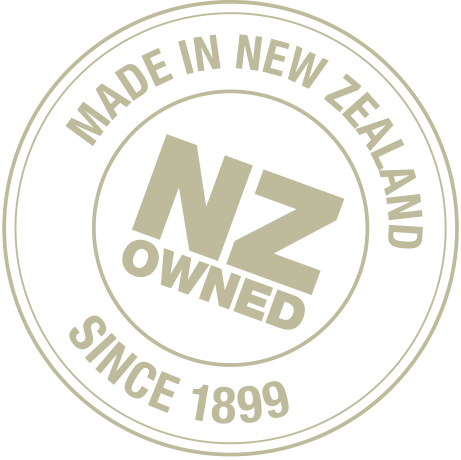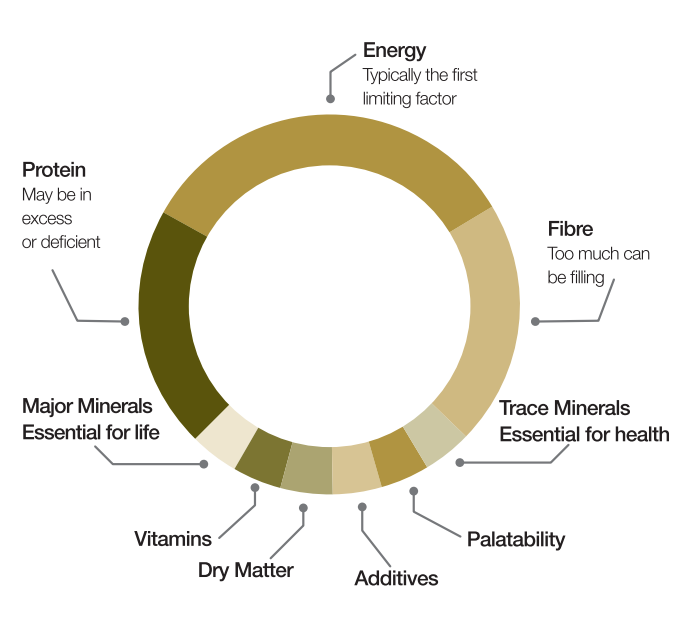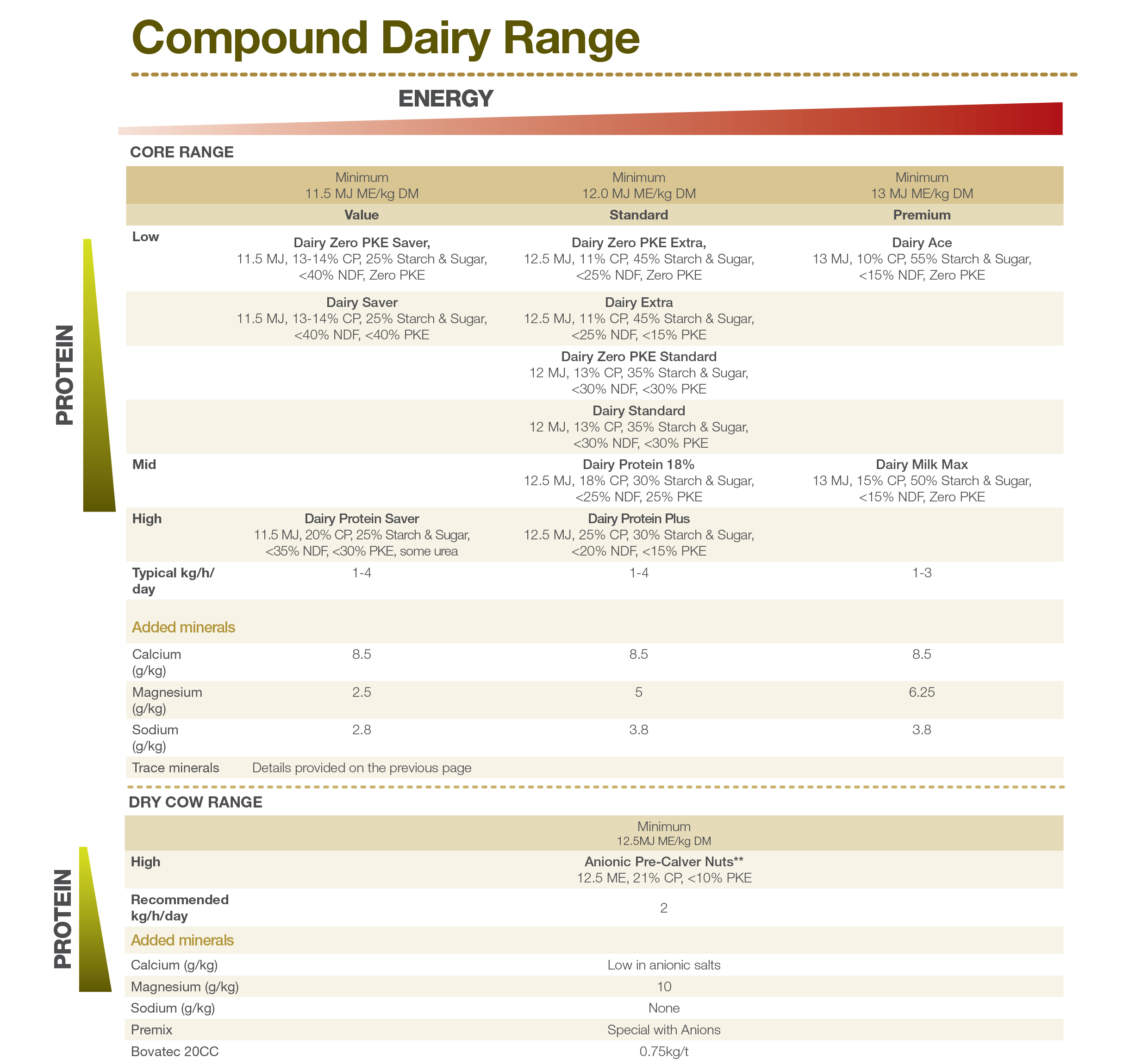Expert knowledge. Expert opinion.Expert formulas.


Compound Dairy Range
Providing the freedom to select the best feed for your herd
The supplementary needs of a herd for maximum financial return and peace of mind depends on many factors including, stage of lactation, level of production and quality and quantity of the forage component. A key determinant for profitable supplementation is identifying the limiting factor at any particular time.

Energy, protein and fibre are invariably the primary determinants of production for dairy cows. Accordingly, the NRM Dairy Range has been developed to provide progressive dairy farmers a choice of energy and protein overlaid with a drop in fibre levels as energy levels rise.
A higher inclusion of by-products which deliver economies could be a good choice when filling a feed deficit within a budget or wishing to feed at higher levels whereas higher starch levels could be more appropriate for cows which are more fully fed when striving for production and milk quality at key times. Cows fed high-quality pasture diets may already be over-supplied with protein and may be best supplemented with low protein compound feed which helps to lower the total dietary protein content. Where pasture protein levels are falling, or where lower protein conserved forages, e.g. maize silage are being fed, a higher protein compound feed may be beneficial.
Supplying something which is already in excess, even if is cheap, could turn out to be unprofitable, whilst something which is limiting, even if it is expensive, can be rewarding. Contact your local NRM Nutrition Specialist to help you selecting the most appropriate option if the best solution is not immediately apparent. Compound feed provides a convenient, efficient route to deliver minerals in a controlled way. The NRM Compound Dairy Feed Range has been enriched with major minerals, trace elements and sometimes vitamins as indicated in the tables (valid spring 2020).
Key benefits
Feeding the appropriate NRM Dairy Compound Feed can help:
- Improve milk production and quality.
- Improve cow condition and fertility.
- Increase carrying capacity and sustain herds through a feed pinch.
- Animal health and welfare along with farmers peace of mind and personal satisfaction.
Trace elements and vitamins added per kg feed
| Ingredient | Value | Standard | Premium |
| Vit A (IU/kg) | 10,000 | 10,000 | |
| Vit D (IU/kg) | 2,000 | 2,000 | |
| Vit E (IU/kg) | 25 | 25 | |
| Chromium (mg/kg) | 3.3 | ||
| Cobalt (mg/kg) | 2.1 | 3.3 | 3.3 |
| Copper (mg/kg) | 49.5 | 75 | 100 (25 as organic) |
| Iodine (mg/kg) | 3.3 | 5 | 5 |
| Manganese (mg/kg) | 33 | 50 | 50 |
| Selenium (mg/kg) | 1.6 | 2.5 | 3.0 (0.5 as organic) |
| Zinc (mg/kg) | 165 | 250 | 350 |
The Value, Standard and Premium ranges are made to order and can be supplied with additives which further extend the ability to meet the particular need of a herd at a particular time. Some products are available with reduced premix and magnesium inclusion for higher feeding rate situations:
- Bovatec® 20CC as an aid in increased production of milk solids.*
- Extra Standard or Premium premix.
- Bioplex High Five, Dicalcium phosphate, Limestone flour, Magnesium Oxide, Mycotoxin binder, Rumen by-pass fat.
- Registered zinc as an aid in the prevention of facial eczema.
- Yeast derived rumen enhancer.
- Zinc methionine for improved foot health and reduction in somatic cell counts.
*Bovatec® 20CC is registered pursuant to the ACVM Act 1997, Registration Number A009679. See www.foodsafety.govt.nz for registration conditions.
NOTICE – CONTAINS ADDED MAGNESIUM OXIDE
The feeding of this product to dairy cows may increase their risk of clinical salmonellosis. It is recommended that veterinary advice is obtained to ascertain potential risks associated with the use of this product in your environment before product is used.
Feeding advice
If milking cows are not currently receiving grain or pellets, transition them onto NRM Dairy Range with 0.5-1kg/milking and gradually increase until the desired intake has been reached.

The Metabolisable Energy (ME) values are calculated from an equation and are not an actual measured value but should provide a reasonable guide to the energy content of the feeds. Information is accurate at the time of going to print but specifications may vary over time. Current individual specification sheets are available on request for each product which include the ingredients which are typically selected from grain and grain by-products, dried distillers grains, oilseed meals, yeast, grass fibre, peas, beans, vegetable oils and fats, molasses, flavour, limestone, magnesium oxide, salt, vitamins and trace elements. **Normally available as a nut but may be supplied as a pellet subject to minimum volume.

